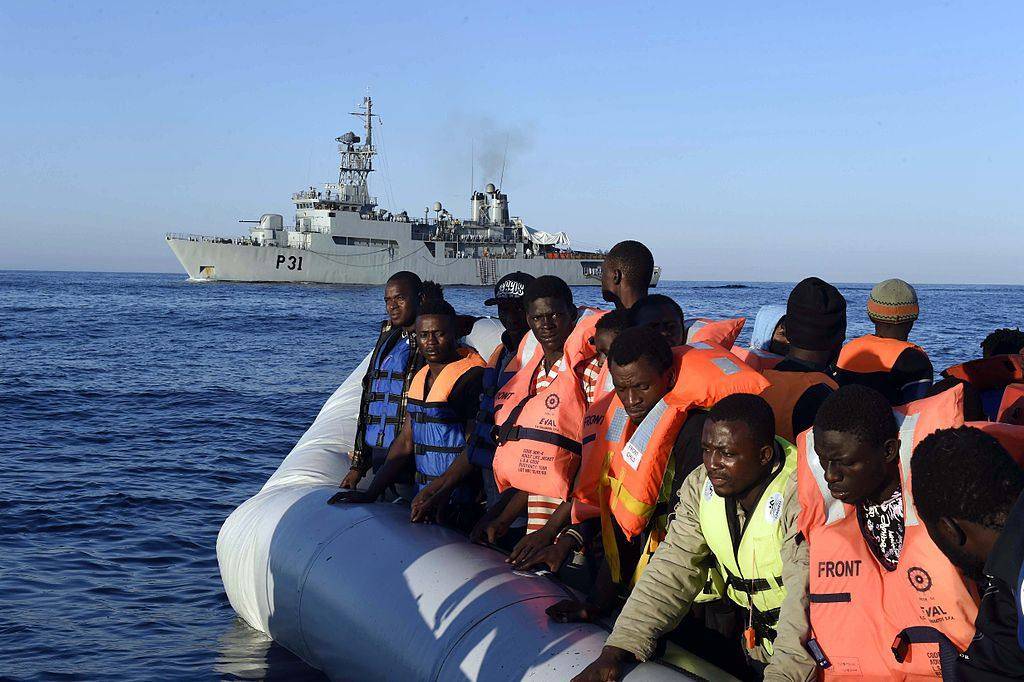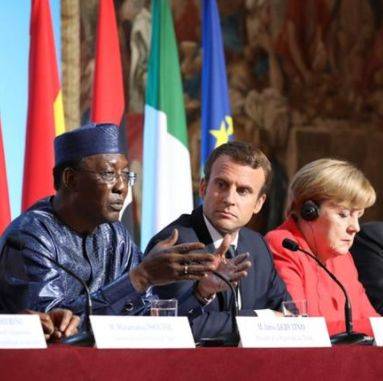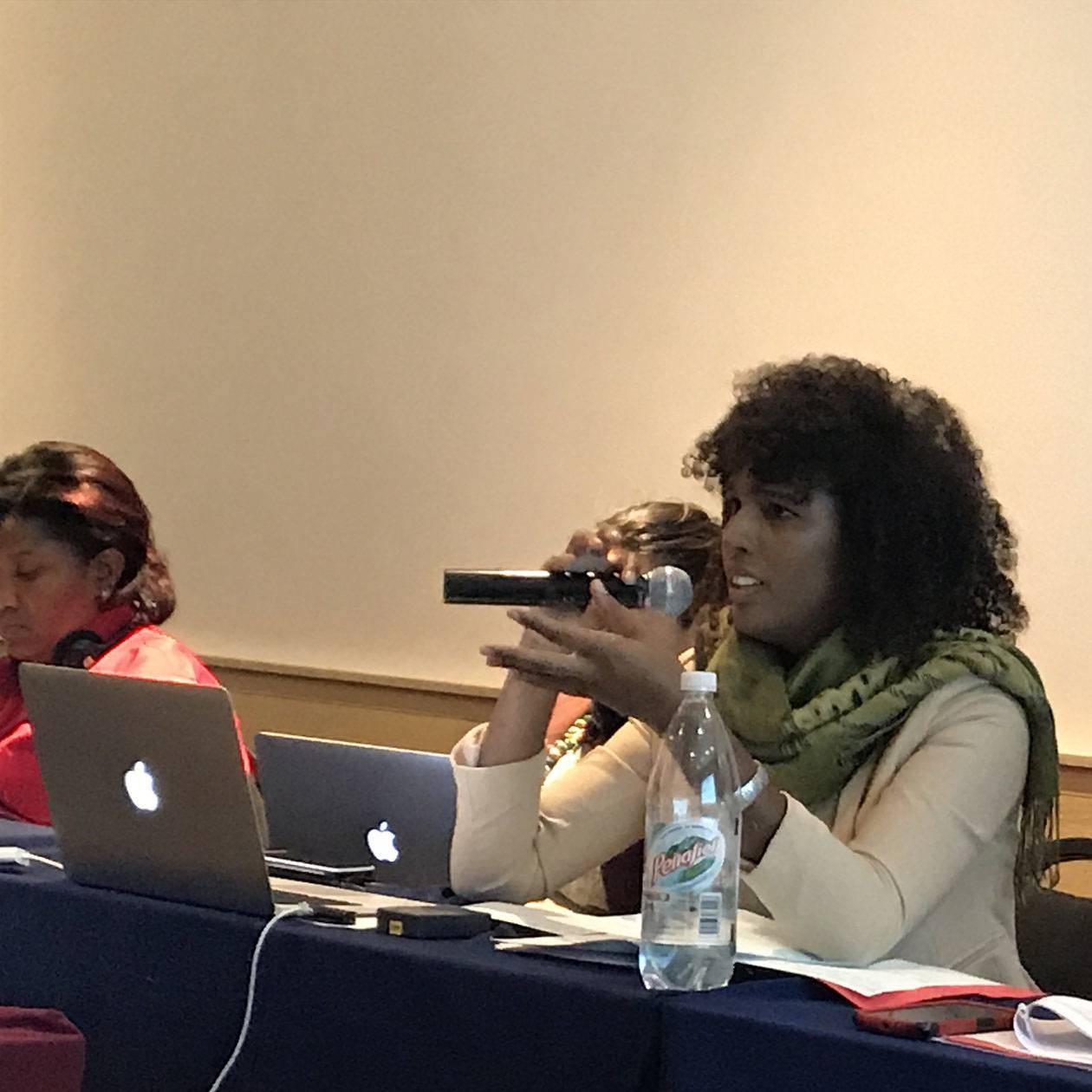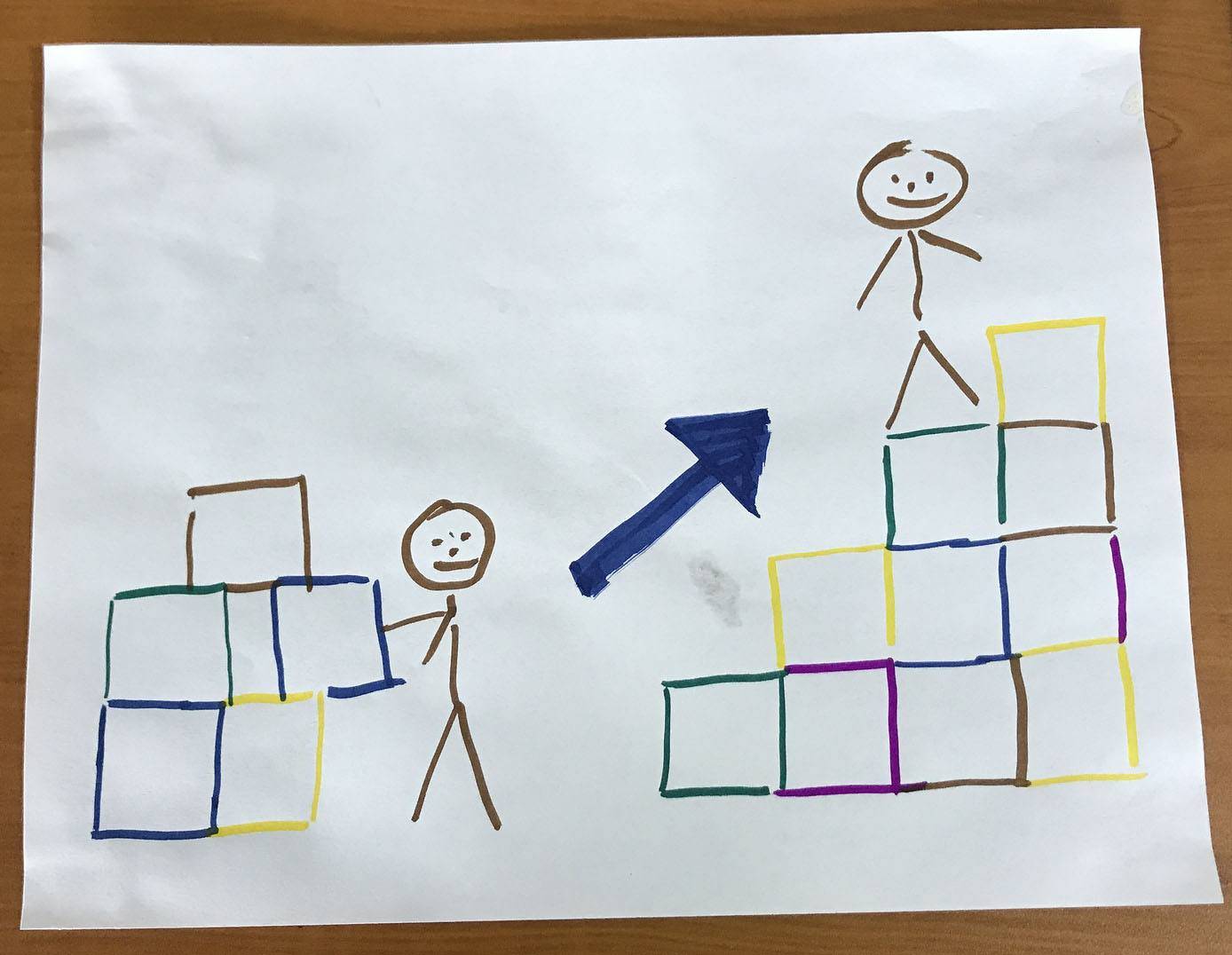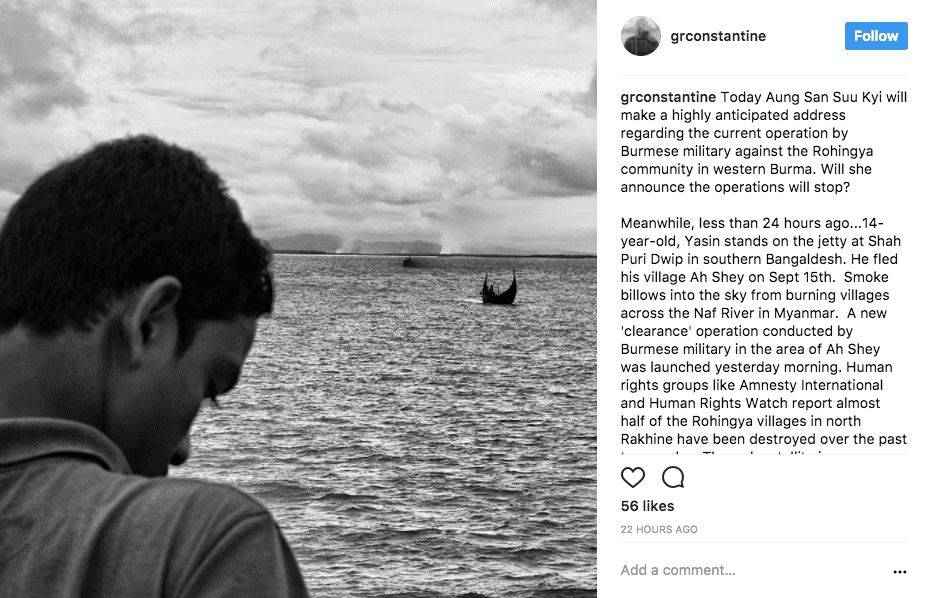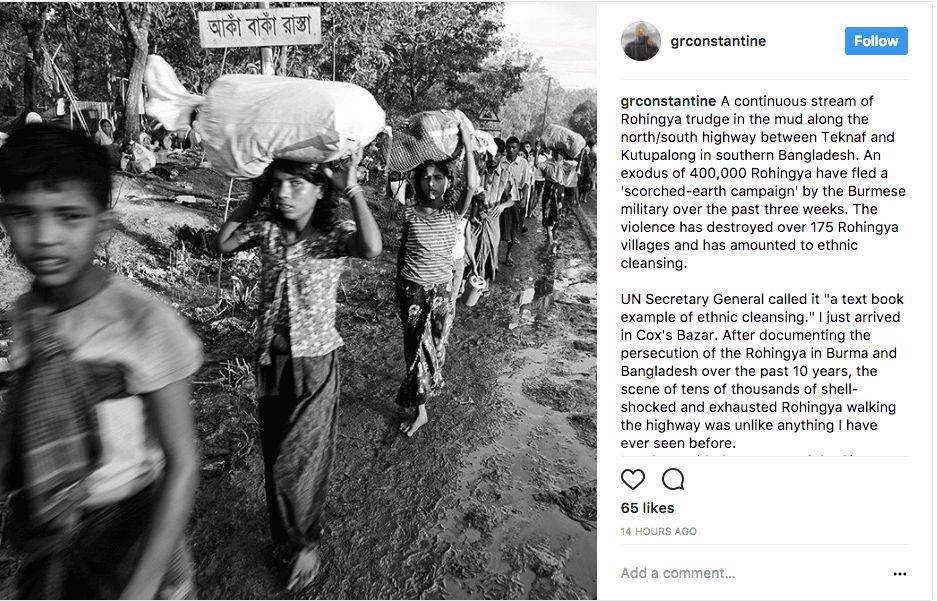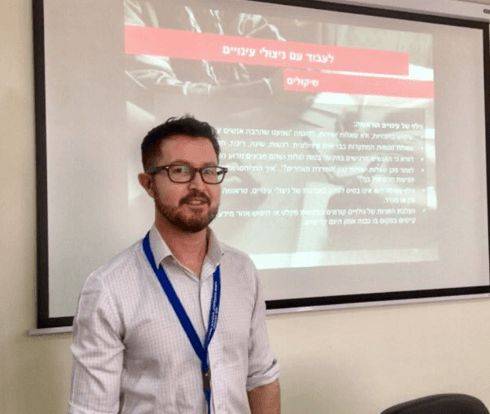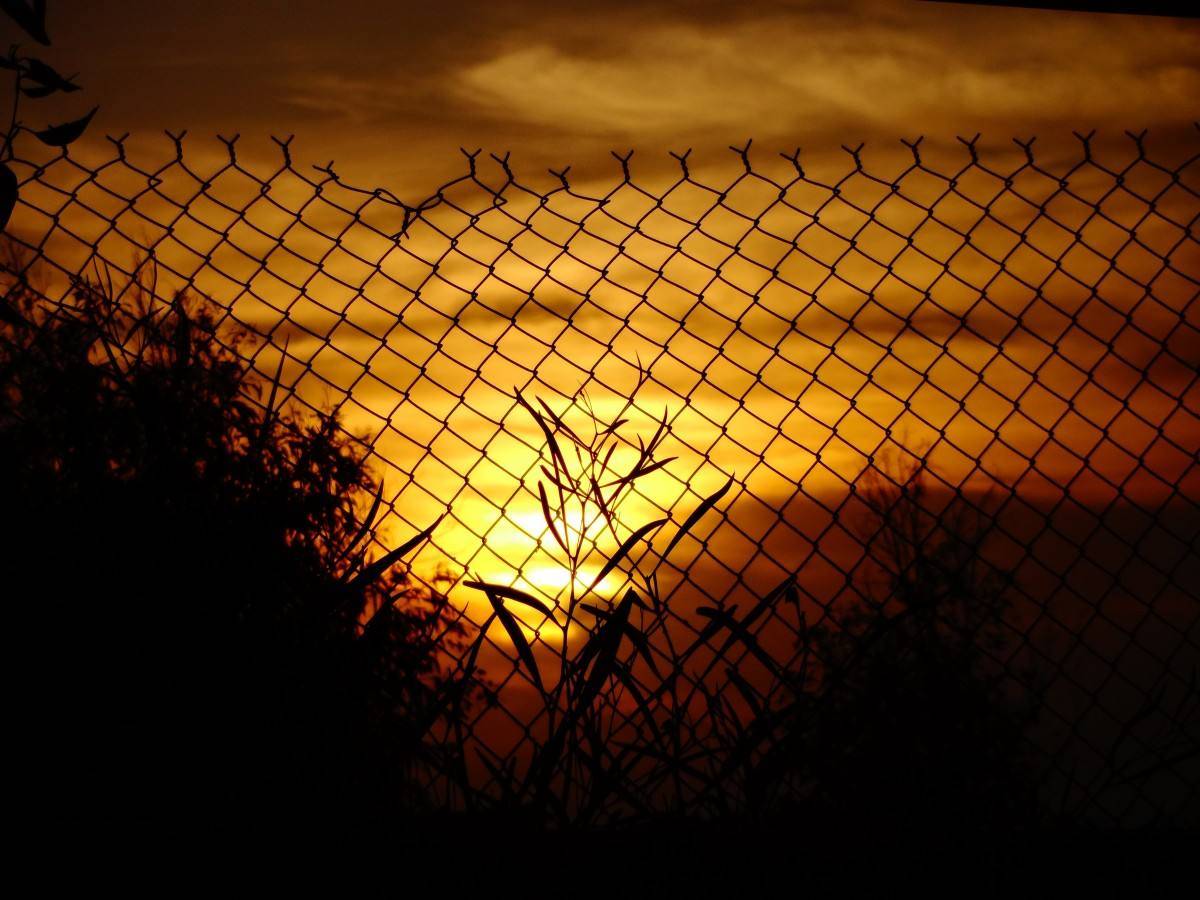Pope Francis Global Compact Plan Calls To End Child Detention
The Vatican's migrants and refugee section has published a comprehensive, 20-point action plan for governments as the two Global Compacts on Refugees and Safe and Orderly Migration develop.
The documents advocate for effective and proven measures which constitute an integral response to the refugee crisis, grouped into actions: to welcome, to protect, to promote, and to integrate.
Section 3b calls encourages States to "adopt national policies which prefer alternatives to the detention of those seeking access to the territory" and further states" .
It specifically highlights States obligations under the Convention of the Rights of the Child (CRC) to adopt alternatives to mandatory detention, which is never in the best interest of the child, no matter their migratory status.
The Vatican's Migrants & Refugees Section is a small action-oriented Vatican office personally directed by Pope Francis helping the Church worldwide to support those who are forcibly displaced by conflict, natural disaster, persecution or extreme poverty; those who are making their difficult way to safety or are stuck; and those who fall victim to human trafficking.
The action plan compliments a speech made by the Pope on August 17 in preparation for Catholic World Migrant Day (January 18) highlights the the lamentable situation of many migrants and refugees fleeing from war, persecution, natural disasters and poverty. In this speech he states "the International Convention on the Rights of the Child provides a universal legal basis for the protection of underage migrants. They must be spared any form of detention related to migratory status, and must be guaranteed regular access to primary and secondary education."
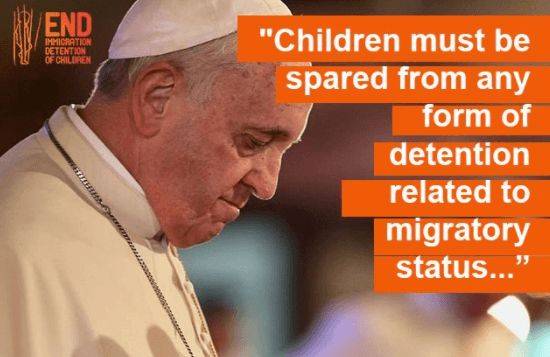
Does Detention Deter? Developments in Italy
On 2 July, European ministers and the European Commissioner for Migration and Home Affairs held emergency talks in Paris after speculations that the Italian Government was considering closing its ports to boats carrying migrants. During the talks the Ministers of Interior of France, Germany and Italy and the European Commissioner discussed “the challenges posed by the increased migratory flow on the Central Mediterranean route”. In a press release the UN High Commissioner for Refugees, Filippo Grandi described the situation in Italy as “an unfolding tragedy”, further urging the European Union for greater solidarity with Italy and calling for a “comprehensive regional approach”.
"Italy is playing its part in receiving those rescued and providing asylum to those in need of protection. These efforts must be continued and strengthened. But this cannot be an Italian problem alone." quote from press release Filippo Grandi, UN High Commissioner for Refugees
The talks resulted in a joint declaration, the countries expressing strong solidarity with Italy, agreeing to provide increased support to Italy and contribute to ‘stem’ the migratory flow and agree to a number of measures. The declaration indicated support for policies and measures that focus on the origin of the migratory flow specifically collaboration with Libya. Specifically, the declaration makes a commitment to improve the standards of immigration detention centres in Libya, to reinforce border controls in Southern Libya (which may result in more use of detention) and utilise the European Union (EU) returns policy, which may result in more use of immigration detention.
Following the discussion with the European minister and the European Commissioner for Migration and Home Affairs, the European Commission proposed an Action Plan to support Italy, reduce pressure and increase solidarity. The Action Plan set out a series of measures that can be taken by the EU Member States, the Commission and EU Agencies and reiterated the need to support Libya.
"The dire situation in the Mediterranean is neither a new nor a passing reality. We have made enormous progress over the past two and half years towards a genuine EU migration policy but the urgency of the situation now requires us to seriously accelerate our collective work and not leave Italy on its own. The focus of our efforts has to be on solidarity – with those fleeing war and persecution and with our Member States under the most pressure. At the same time, we need to act, in support of Libya, to fight smugglers and enhance border control to reduce the number of people taking hazardous journeys to Europe." – quote from press release European Commission President Jean-Claude Juncker
The Action Plan recommended Italy to increase “reception capacity and substantially increasing detention capacity to reach at least 3,000 urgently” and prolong the maximum duration of detention in line with EU law as well as increasing the existing capacity of stationary hotspots. Further recommending improved coordination of Search and Rescue activities (SAR) in Libya; establishment of a fully operational Maritime Rescue and Coordination Centre (MRCC) and set up actions to enhance the capacity of Libyan to control borders.
The use of immigration detention to reduce migratory flow and as a form of deterrence can be ineffective at reducing or deterring irregular migration. Detention is arbitrary and unlawful if applied for the purposes of deterrence (IDC 2015, p. 3). There is no empirical evidence to suggest that the threat of being detained deters irregular migration, or more specifically, discourages persons from seeking asylum. Subsequently restrictive measures can introduce greater risks, rechanneling flows of migrants, forcing migrants to seek assistance from people smugglers and undertake more dangerous journeys.
There are alternatives to detention (ATD) that provide effective, humane and less costly migration management options. Italy is yet to develop ATD as required by EU and International law. The IDC’s handbook There Are Alternatives identifies examples of alternatives to detention being used worldwide.
Find out more
- New Law Prevents Child Detention in Italy Despite Expansion of Detention Centres https://idcoalition.org/news/italy-child-detention-law-change/
- Article Italy boats block - https://www.theguardian.com/world/2017/jun/28/italy-considers-closing-its-ports-to-ships-from-libya#img-1
- IDC Detention Deterrence - https://idcoalition.org/wp-content/uploads/2015/04/Briefing-Paper_Does-Detention-Deter_April-2015-A4_web.pdf
- UN High Commissioner for Refugees Press release - http://www.unhcr.org/news/press/2017/7/5957c2304/high-commissioner-grandi-urges-solidarity-italy.html
- Interior minister and commissioner statement http://europa.eu/rapid/press-release_STATEMENT-17-1876_en.htm
- EU Commission press release - http://europa.eu/rapid/press-release_IP-17-1882_en.htm
- Action Plan https://ec.europa.eu/home-affairs/sites/homeaffairs/files/what-we-do/policies/european-agenda-migration/20170704_action_plan_on_the_central_mediterranean_route_en.pdf
- Alternatives to detention - https://idcoalition.org/alternatives-to-detention/
Future Focus Needed

“Italy alone will need an estimated 1.6 million regular migrants over the next decade to sustain its welfare and pension schemes.” Leaders of The leaders of France, Germany, Italy and Spain in a joint statement.
Fortunately for both the African and European leaders, there are alternatives to a focus on expanding border forces and using detention to stop people moving across frontiers.
“It’s great to see the UNHCR following the lead of African civil society organisations, re-focussing resources to ensure alternatives such as freedom of movement and support services provided through reception centres” said IDC’s Africa and Middle East Coordinator, Junita Calder. “Let’s hope that their government counterparts in both Africa and Europe look at the efficacy of such options and allocate resources to increase their use.”

“It’s great to see the UNHCR following the lead of African civil society organisations, re-focussing resources to ensure alternatives…” Junita Calder, IDC Africa and Middle East Coordinator
Making Alternatives Work: Global Implementers Workshop

International Implementers of Alternatives to Detention Meeting, August 2017, Mexico City
Practitioners from around the world attended a 2-day workshop in Mexico City to share insights into successful implementation of alternatives to detention.
20 civil society actors and partners actively developing and implementing alternatives attended the workshop, including:
FM4 Paso Libre (Mexico)
Institute for Women in Migration (IMUMI) (Mexico)
La 72 Hogar Refugio para Personas Migrantes (Mexico)
Living Water Community (Trinidad and Tobago)
Sin Fronteras (Mexico)
During the workshop, participants discussed screening and referral processes, case management and the importance of building engagement rather than having an enforcement approach.
There is a growing interest from both government and civil society stakeholders in exploring more reliable, cost-effective alternatives to detention in order to address the human rights and humanitarian concerns and resource constraints associated with detention.




This workshop provided an opportunity to explore how alternatives operate in a variety of local contexts and translate international human rights standards to concrete implementation.
A report will be available shortly detailing insights from the workshop.
If you would like to know more about alternatives to detention, use our free online learning course available here.

Stakeholders evaluate ATD implementation in Mexico

On July 13 and 14, 2017, stakeholders from the government, civil society and international organisations working in Mexico came together to evaluate and share experiences on the implementation of alternatives to detention (ATD) in the country. A National Roundtable on Case Management was held on day one, where participants reflected specifically on the first ATD pilot programs that were implemented in 2015 and 2016 in Mexico City, Tabasco and Chiapas. The diverse actors involved in the development and implementation of these programs discussed how learnings from these first initiatives provided the foundation for current ATD action plans: From the first pilot for just 20 unaccompanied children in Mexico City, to the more than 1,200 asylum seekers that have been released from detention centers between July 2016 and June 2017.
Representatives from the National Migration Institute (INM), Mexican Refugee Commission (COMAR) and the Federal Office for Child Protection (PFPNNA) shared their experiences in coordinating and collaborating on ATD, highlighting as primary benefits of alternatives the ability to support especially vulnerable asylum seekers outside of detention, compliance with legal obligations to not detain children, and that people could be granted documents with temporary immigration status.

All stakeholders participated in working group discussions on identification and decision-making, placement options and case management -all essential processes to ensure the effectiveness of ATD. Stakeholders identified challenges, positive practices and opportunities to strengthen each process.
The following day, additional actors who are currently implementing ATD, both formally and informally, joined the discussions, as part of the National Exchange on ATD Implementing Experiences. Representatives from more than 20 civil society and international organizations that are developing and implementing ATD across the country participated. They identified the primary challenges in their ATD implementation and discussed possible solutions, such as continuing to reflect on experiences as a group and share ATD models, protocols, and manuals in order to better learn from one another.

The national meetings were collaboratively organized by Asylum Access México, Aldeas Infantiles SOS, the Institute for Women in Migration (IMUMI), Sin Fronteras I.A.P. and the IDC. These organizations, alongside other partners, have promoted ATD in Mexico in order to highlight the benefits of having people live freely in the community while their migration situation is resolved or while they await return or removal from the country.


The Plight of Muslim Rohingya
The plight of Muslim Rohingya: What does their future hold?
On August 25th The Myanmar government undertook a horrific crackdown on the minority Muslim Rohingya living in the Rakhine state of west Myanmar. Arakan Salvation Army militants coordinated numerous attacks on 30 Myanmar police outposts and an army base. In response, the Myanmar army and other armed ethnic groups hostile to the Rohingya initiated a string of mass atrocities including; attacks on villages, burning of homes, and widespread reports of rape. As a product, there has been mass exodus- over 300,000 currently reported Rohingya fleeing to nearby borders in Bangladesh
Photo: Greg Constantine
What’s the background?
The Rohingya are a Muslim ethnic minority living in the Rakhine state of West Myanmar. The Myanmar nationality law (1982) does not legally recognize Rohingya as citizens, and has historically subjected this ethnic group to discrimination, abuse and neglect. The Myanmar government insists that all Rohingya are immigrants from Bangladesh, despite living in the Rakhine state for generations. In effect, the Rohingya are subject to marriage and child-birth restrictions, statelessness, and have limited access to health care, schools, jobs, and freedom of movement.
In 2012, following the alleged gang rape of an ethnic Rakhine woman by three Muslim Rohingya males, tensions between Muslim Rohingya and the predominantly Buddhist Rakhine population erupted. Targeted attacks and rioting forced tens of thousands of Rohingya to flee into nearby displacement camps.
IDC member Fortify Rights exposed local orders and internal government documents in 2014, revealing severe restrictions on freedom of movement, marriage, childbirth, and other aspects of daily life for more than one million Rohingya Muslims in Rakhine State. The government continues to confine more than 120,000 people—mostly Rohingya survivors of 2012 violence—to 38 internment camps in eight townships in Rakhine State.
On August 23rd, 2016, Myanmar state counsellor Aung San Suu Kyi established a nine- member advisory commission on the Rakhine state. The aim of the committee was to address underdevelopment and humanitarian issues surrounding Muslim Rohingya.
In October 2016, Rohingya militants attacked Myanmar police outposts in the North of Myanmar’s Rakhine state in response to the continued systematic persecution of Muslim Rohingya. In response, the Myanmar army launched a massive crackdown on the entire Rohingya population. Amnesty International have documented widespread extensive and horrific human rights abuses on Muslim Rohingya as a result. Unlawful killings, arbitrary arrests, rape and sexual assault of women and girls, and the burning of more than 1,200 buildings, including schools and mosques were included. This crackdown displaced more than 80,000 Rohingya Muslims and sent them fleeing into nearby Bangladesh.
Following the Myanmar Army’s crackdown in northern Rakhine State in October, the U.N. Human Rights Council passed a landmark resolution on March 24 ordering an independent, international Fact-Finding Mission to investigate human rights violations and abuses in Myanmar’s Rakhine State. The President of the Human Rights Council appointed three experts to lead the mission.
IDC member Fortify Rights recommended that the Fact-Finding Mission focus on human rights violations by state and non-state actors in Rakhine, Kachin, and Shan states. The Government of Myanmar “disassociated” itself from the resolution. Suu Kyi explained that her government would not cooperate with the Mission. The Myanmar military and Suu Kyi’s offices have routinely denied allegations of serious human rights violations in Rakhine State since October 2016. On August 6, another commission appointed by Suu Kyi and led by Vice President Myint Swe dismissed allegations of serious human rights violations in Maungdaw Township since October.
Latest developments
IDC member Human Rights Watch has obtained satellite data and images that are consistent with widespread burnings in northern Rakhine State, encompassing the townships of Rathedaung, Buthidaung, and Maungdaw. To date, Human Rights Watch has found 21 unique locations where heat sensing technology on satellites identified significant, large fires.
Matthew Smith, the Chief Executive Officer for Fortify Rights has stated that “Mass atrocity crimes are continuing. The civilian government and military need to do everything in their power to immediately prevent more attacks.” Fortify Rights interviewed 24 survivors and eyewitnesses of attacks in the last week from 17 villages in the three townships of northern Rakhine State—Maungdaw, Buthidaung, and Rathedaung. Survivors and eyewitnesses described mass killings and arson attacks by the Myanmar Army, Myanmar Police Force, Lon Tein (“security guards”) riot police, and local armed-civilians.
HRW argues that Suu Kyi's inflammatory propaganda is fueling anti-Rohingya and anti-aid-worker sentiment at a time when she should be doing everything in her power to instill calm, promote human rights, and open more humanitarian space. “Rather than deal with ongoing atrocities, the Suu Kyi government has tried to hide behind the Advisory Commission,” said Matthew Smith “The Commission responded with concrete recommendations to end violations, and the government should act on them without delay.”
Between the Annan Commission, U.N. fact finders, and Myanmar’s own civil society, the government has an opportunity make real progress in ending and remedying atrocities,” said Matthew Smith. “Some officials are looking to sweep Rakhine under the rug. The military and civilian authorities should cooperate with international efforts to establish the facts and hold perpetrators accountable. There’s no other way forward.”
Bangladesh: Despite being the main destination for Rohingya, resources are stretching thin
Sharing a border with Myanmar, Bangladesh has remained the main destination for Rohingya fleeing violent persecution. Since August 23rd however, Bangladesh has stressed that it cannot cope; lacking the food, water and shelter resources necessary to absorb the massive influx of Rohingya. In effect, as the crisis continues, Bangladesh has become less accommodative of Rohingya refugees. There are at least 400,000 Rohingya living in squalid camps already in Bangladesh, and the latest UN figures have estimated around 409,000 have recently entered Bangladesh from Myanmar since violence erupted. This has led to Bangladeshi border authorities to deny the entry of Rohingya into Bangladesh where they can, and confine them to the Cox’s Bazaar area near the border. This report is supported by numerous other reports of authorities leaving thousands stranded on the border in makeshift camps.
Bangladesh is aware that is in the midst of an intense humanitarian crisis, and isn’t equipped to deal with the influx of refugees. “We are stopping them wherever we can, but there are areas where we can’t stop them because of the nature of the border; forests, hills,” said H.T. Imam, Prime Minister Sheikh Hasina’s political adviser. In effect, Bangladesh has given serious consideration to relocate Rohingya to an Island named Thengar Char. Makeshift camps in Cox’s Bazar in south-east Bangladesh have grown so rapidly since the crisis, they have run out of space.
Malaysia and Thailand: Prepared to shelter Rohingya, but immigration detention seems likely
Zulkifli Abu Bakar, the director-general of the Malaysia Maritime Enforcement Agency has claimed that it is ready and willing to provide shelter for Muslim Rohingya fleeing violence and persecution in Myanmar. As a Muslim-majority nation already home to more than 100,000 Rohingya refugees, Malaysia will probably house the new arrivals in immigration detention centers. Illegal entry and stay policy in Malaysia is criminalized, and immigration detention is where foreigners without documents are typically held.
At the same time, a protest on 30 August by the Rohingya against recent events in Myanmar saw more than a hundred Rohingya arrested and detained, with some subsequently charged for entering into Malaysia without valid travel documents. In response, hundreds of ethnic Rohingya protestors have gathered in the Malaysian capital of Kuala Lumpur (Wednesday Aug 30) demanding an end to the bloodshed in Rakhine.
Thailand, navy spokesman Chumpol Lumpiganon said the government and the navy are preparing to deal with hundreds of Rohingya migrants who flee violence by boats and often drift into Thai waters. The Third Fleet, which oversees the Andaman Sea, and the navy operation centre, has been put on alert along the Andaman coast from Ranong to Satun. The navy will provide assistance to the migrants on humanitarian grounds and authorities will not push them out to sea if they do not plan to travel to a third country. If Rohingya are spotted in Thai waters, the navy will extend assistance in line with international practices. As far as providing shelter, and the possibility of immigration detention, Thailand has not commented. Given Thailand’s history of immigration detention policy, it is likely that such an approach will apply to Rohingya.
In both Malaysia and Thailand, many Rohingya are currently held in immigration detention facilities that fall far below minimum international standards, and in the case of Thailand in particular, Rohingya can be subject to indefinite detention.
Immigration detention should always be a last resort. No one should be subject to indefinite detention. Governments should implement alternatives to detention that ensure the protection of the rights, dignity and wellbeing of individuals. These basic minimum human rights standards are often breached, when there aren’t defined limits on the length of detention.
There are alternatives to detention that better respect the human rights of refugees, asylum seekers and migrants. Further, alternatives cost 80% less than immigration detention. In the case of people who are stateless, detention should never be used.
India: Already home to thousands of Rohingya, and unlikely to accept more
While in the past India had welcomed Rohingya refugees, a rise in nationalist and anti-Islamic sentiments have prompted demands for their deportation.
Due to discourse undertaken by Suu Kyi, there is an idea surrounding fleeing Rohingya as comprising mostly of Islamic terrorists. India worries that these refugees pose a security risk to India, and may further radicalize the existing political environment, In effect, around 40,000 undocumented migrants may be deported if India decides to do so. Ultimately, India are not accommodative of fleeing Rohingya and unless it is pressured by the international community, it probably won’t be swayed.
This article was authored by Jorge Nicholas as part of Asia Pacific Communications Internship.
New Report: Immigration Detention in Spain
IDC Member, El Servicio Jesuita a Migrantes-España (SJM-E) has now published a short summary in English of their 2016 report on the use of immigration immigration detention in Spain.
It records that immigration detention is being widely used, especially in the case of forced returns.
Workshop: Stateless Persons in the South African Development Community
A workshop addressing the vulnerability of stateless persons in the South African Development Community (SADC) was held at the 13th Civil Society Forum.
Stateless people are at high risk of being detained, often for indefinite periods of time as their migration status can be difficult to resolve. This workshop was the second meeting of the SADC Network on Statelessness supported by the Citizen Rights in Africa Initiative.
Statelessness is defined by the 1954 Convention on the Status of Stateless Persons as persons who are not considered “as a national by any state under the operation of its laws”. UNICEF estimates there are approximately ten million stateless persons globally.
It was attended by three IDC members, the Lawyers for Human Rights South Africa, CoRMSA and the Scalabrini Centre in Cape Town.
Liesl Muller of Lawyers for Human Rights South Africa tweeted that “Statelessness is a violation of the right to human dignity which is enshrined in the African Charter”.

The workshop found persons at risk of statelessness include those without birth registration, without hospital records, with mixed parentage, those who have experienced the death or desertion of one or both parents, and those who have experienced irregular migration.
Over 200 million children worldwide are born without birth certificates. According to Muller, due to the low rate of birth registration in the SADC region, more than half of children remain unregistered until age five.
Compounding this is the fact that “twenty-five countries don’t allow women to pass nationality to spouses/kids or deprive them of nationality at marriage or divorce,” says Muller.
Adults and children who are stateless are more likely to end up stagnated in detention for long periods of time with little to no control over the blockades that prevent their deportation. This can inflict severe mental and emotional harm on the persons, and would be avoidable if further steps were taken to avoid statelessness in the first place.

Child statelessness presents several very difficult challenges for children in SADC, as it can prevent children from attending school and makes them unable to legally graduate secondary school. Additionally, children can also be forced to relocate to a country completely unfamiliar to them, and can also end up being stranded in detention.
This is particularly pertinent to the SADC as only eight countries of the African Union have the right to a nationality in their Constitution, with three of those being in the SADC. Furthermore, Muller tweeted that “all Africans should be allowed to have dual citizenship, because of the African diaspora”.
Ultimately the workshop concluded that stateless children should be afforded the right to the nationality of the country of birth, if done in the best interest of the child. In addition to this, Muller tweeted that each person who is denied the right to a nationality must be provided with the avenue and means to appeal to court for recognition.
More Information

This handbook outlines the situation of Childhood Statelessness in South Africa and includes case studies and recommendations. It is written by IDC Members, Lawyers for Human Rights South Africa and the Institute on Statelessness and Inclusion.

This handbook outlines more than 250 alternatives to detention, that are more affordable, effective and humane than immigration detention. Authored by the International Detention Coalition.
This article was authored by Lily Raynes
Exploring alternatives to detention for torture survivors in Israel
There are an estimated 3,000 asylum seekers currently in Israel who have experienced torture in the Sinai prior to entering the country.
Research from IDC member Hotline for Refugee and Migrants has identified both the patterns and the impact of this torture on the lives of asylum seekers and their families from Eritrea and Sudan.
This detrimental impact on physical and psychological wellbeing has been compounded by the increased use of immigration detention for many of these asylum seekers, further traumatizing an already vulnerable population in need of urgent care and rehabilitation.
Asylum-seeker adults in Israel are jailed under the Anti-Infiltration Law that allows the state to jail, without trial “infiltrators” who’ve crossed the border for three months in Saharonim prison and can then be transferred to the Holot detention facility for up to one year. While detainees may leave the facility during the day, they may not work and must sleep in the facility located near the border of Egypt.

IDC Members, Hotline for Refugee Migrant Rights , have released a report. “Reappears” details new testimonies that show that the Bedouin smugglers are still active in the Sinai.
This is how Majed (not his real name) described it:
“We received three cups of water per day – morning, lunch and evening. We ate a cup of rice that was soaked in water once a day. We lived in an underground basement so the soldiers don’t discover us…”
Since 2010 NGOs in Israel, including Hotline for Refugees and Migrants, have worked to document, identify and refer cases in need of critical care, with few local rehabilitation options available. The increased use of Holot to encourage the return of asylum seeker has further challenged this work.
In June this year, the IDC Director, Grant Mitchell, visited Israel to build on this work, presenting to UNHCR and NGOs on strategies and techniques when working with torture survivors.

IDC Director Grant Mitchell presenting to the Ministry of Interior in Jerusalem, June 2017
Building on the IDC’s global work to support national level alternative to detention pilots for vulnerable populations, the IDC presented with UNHCR to government officials on a range of international models being used to support torture survivors in the community. This includes the new IDC and UNHCR joint Vulnerability Screening Tool and Foundation House’s Integrated Recovery Model. Both models assist to early identify, refer and provide rehabilitation to asylum seekers and torture survivors.
There was receptivity to explore rehabilitation options for this group with follow up being explored building on existing psychiatric and psychological counselling services for non-refugee trauma survivors. The IDC hopes to return to later in the year to provide further training and technical support.
IDC and Partners Continue to Promote Alternatives to Detention in Libya

For some time now, IDC has been working with partners in Libya to promote alternatives to detention.
This has included a workshop with civil society groups and NGOs that led to a plan of action to pilot alternatives (2014-15), followed by an alternatives to detention workshop with Libyan stakeholders including government departments and NGOs organised with support from DRC and IOM (2016).
The alternatives to detention campaign has now been taken up through the Libyan Mixed Migration Working Group which is co-chaired by UNHCR and IOM.
Using the principles of the previous workshops that encourage the promotion of alternatives for women and children and piloting alternatives for labour migrants, plans are underway to organise a follow up meeting with Embassies of affected countries to discuss alternatives to detention in the Libyan context.
It is well known that many people in detention in Libya rely on their Embassies for assistance and so establishing a link with Embassy focal points will hopefully foster an approach that promotes vulnerability screening and referrals where appropriate.
Recently the UN High Commissioner for Refugees (UNHCR) appealed to donors for funds to provide “meaningful alternatives” for people taking dangerous boat journeys from Africa to reach Europe.
While many challenges remain when working in the context of Libya, such as remote management and impediments to access due to insecurity and remote detention locations, it is encouraging to see that local organisations, civil society groups, NGO and UN agencies are coordinating efforts to promote alternatives to detention.

This article was authored by Dr Melissa Phillips, a member of the IDC International Advisory Committee.
